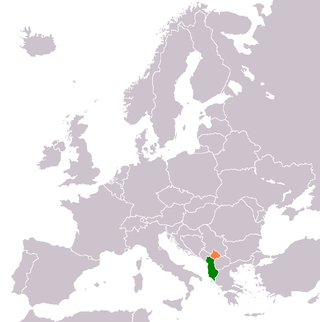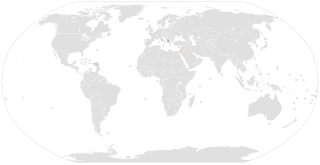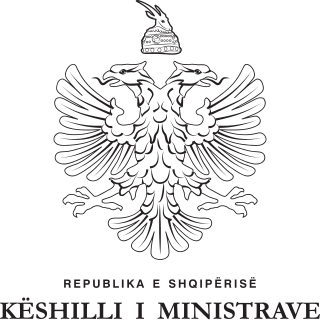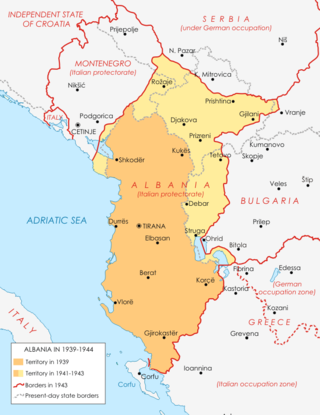Contents
| |||||
| Decades: | |||||
|---|---|---|---|---|---|
| See also: | Other events of 2019 List of years in Albania | ||||
| |||||
| Decades: | |||||
|---|---|---|---|---|---|
| See also: | Other events of 2019 List of years in Albania | ||||
Albania is a unitary parliamentary constitutional republic, in which the president of Albania is the head of state and the prime minister of Albania is the head of government in a multi-party system. The executive power is exercised by the Government and the prime minister with its Cabinet. Legislative power is vested in the Parliament of Albania. The judiciary is independent of the executive and the legislature. The political system of Albania is laid out in the 1998 constitution. The Parliament adopted the current constitution on 28 November 1998. Historically Albania has had many constitutions. Initially constituted as a monarchy in 1913, Albania became briefly a republic in 1925, and then a authoritarian monarchy in 1928. In 1939 Albania was invaded by Fascist Italian forces, imposing a puppet state, and later occupied by Nazi German forces. Following the partisan liberation from the Nazis in 1944 a provisional government was formed, which by 1946 had transformed into a communist one-party state. In March 1991 democracy was restored with multi-party elections.

The prime minister of Albania, officially the prime minister of the Republic of Albania, is the head of government of Albania. The office of the prime minister is a core institution in the politics of Albania formed after the Albanian declaration of independence on 28 November 1912. Since that time, the nation has navigated a dynamic political evolution spanning distinct periods, encompassing a monarchy, a communist regime and the eventual democratic order. In 1912, Ismail Qemali was inaugurated as the first prime minister of Albania, guiding the nation toward sovereignty amidst the complex conditions in the Balkans. In 1944, Enver Hoxha implemented a radical change in government, transforming Albania into an authoritarian and isolationist communist regime. In 1991, the nation transitioned into a democracy that marked a notable shift, when Fatos Nano emerged as the first post-communist prime minister of Albania.

Edi Rama is an Albanian politician, painter, writer, former university lecturer, publicist and former basketball player, who has been serving as the 33rd and incumbent Prime Minister of Albania since 2013 and chairman of the Socialist Party of Albania since 2005. He was appointed Minister of Culture, Youth and Sports in 1998, an office he held until 2000. First elected mayor of Tirana in 2000, he was reelected in 2003 and 2007.

Ilir Rexhep Meta is an Albanian politician. He served as the president of Albania from 24 July 2017 to 24 July 2022.

Hashim Thaçi is a Kosovar Albanian politician who was the president of Kosovo from April 2016 until his resignation on 5 November 2020 to face a war crimes tribunal on charges of crimes against humanity. He was the first prime minister of Kosovo and the Foreign minister and deputy prime minister in the new cabinet led by Isa Mustafa, which assumed office on 12 December 2014.

Albin Kurti is a Kosovar Albanian politician who has been serving as Prime Minister of Kosovo since 2021, having previously held the office from February to June 2020.

International governments are divided on the issue of recognition of the independence of Kosovo from Serbia, which was declared in 2008. The Government of Serbia does not diplomatically recognise Kosovo as a sovereign state, although the two countries have enjoyed normalised economic relations since 2020 and have agreed not to try to interfere with the other's accession to the European Union.

The Ministry for Europe and Foreign Affairs is a department of the Albanian Government, in charge of diplomacy, foreign policy and the process of admission of Albania into the European Union. The ministry also provides support to Albanian citizens residing abroad. In September 2017, the ministry was restructured and it was merged with the Ministry of European Integration.

Albania–Kosovo relations refer to the current, cultural and historical relations of Albania and Kosovo. Albania has an embassy in Pristina and Kosovo has an embassy in Tirana. There are 1.8 million Albanians living in Kosovo – officially 92.93% of Kosovo's entire population – and Albanian is an official language and the national language of Kosovo. Likewise, the peoples of the two countries have practically identical traditions and folklore. Kosovo is the birthplace of Albanian nationalism such as the League of Prizren. In addition, the strong relations are highlighted in successive polls showing majority of ethnic Albanians in both states wanting unification. Both countries and their citizens refer to the relationship as "one nation, two states" as highlighted in the popular pan-Albanian slogan "Jemi një".

Albania has recognized Israel as a state since April 19, 1949. Diplomatic relations between the countries were established on August 19, 1991. Albania has an embassy in Tel Aviv and Israel has an embassy in Tirana.

The accession of Albania to NATO took place in 2009. Albania's relationship with the North Atlantic Treaty Organization (NATO) began in 1992 when it joined the North Atlantic Cooperation Council. In 1994, it entered NATO's Partnership for Peace, which began Albania's process of accession into the alliance. In 1999, the country received a Membership Action Plan (MAP). The country received an invitation to join at the 2008 Bucharest Summit and became a full member on April 1, 2009.

The Council of Ministers is the executive branch that constitutes the Government of Albania. The Council is led by the Prime Minister of Albania. The prime minister is nominated by the President from among those candidates, who enjoy majority support in the Parliament; the candidate is then chosen by the Parliament. In the absence of the prime minister, the Deputy Prime Minister takes over his functions. There are 19 other government members, serving as deputy prime ministers, government ministers or both; they are chosen by the prime minister and confirmed by the Parliament.

Liberation Day in Albania is commemorated as the day, November 29, 1944, in which the country was liberated from Nazi Germany forces by the Albanian resistance during World War II.
The following lists events that happened during 2004 in Republic of Albania.
The following lists events in the year 2017 in Albania.
Events in the year 2018 in Albania.

Early parliamentary elections were held in North Macedonia on 15 July 2020. It was originally scheduled for November 2020, but Prime Minister Zoran Zaev called early elections after the European Council failed to come to an agreement on starting talks with North Macedonia on joining the European Union in October 2019. The election date was set for 12 April, but was postponed until July due to the COVID-19 pandemic in North Macedonia.

The Open Balkan is an economic and political zone of three member states in the Balkans, those being Albania, North Macedonia and Serbia. The zone has a total area of 131,935 km2 (50,940 sq mi) and an estimated total population of almost 12 million located in Central and Southern Europe. The official languages are Albanian, Macedonian and Serbian. Its administrative centres are the cities of Belgrade, Skopje and Tirana. With the establishment of the zone, all three member states aim to increase trade and cooperation as well as improve bilateral relations.

Belinda Balluku is an Albanian politician serving as Deputy Prime Minister of Albania since 2022 and as Minister of Infrastructure and Energy under Prime Minister Edi Rama since 2019.

Bledar "Bledi" Çuçi is an Albanian politician. From January 2019 until December 2020 he served as Minister of Agriculture and Rural Development in the second cabinet of Edi Rama. On 16 December 2020, he was chosen by Prime Minister Edi Rama to serve as Interior Minister following the resignation of Sandër Lleshaj after mass protests hit the country following the police shooting of a 25 year old man who broke quarantine curfew.